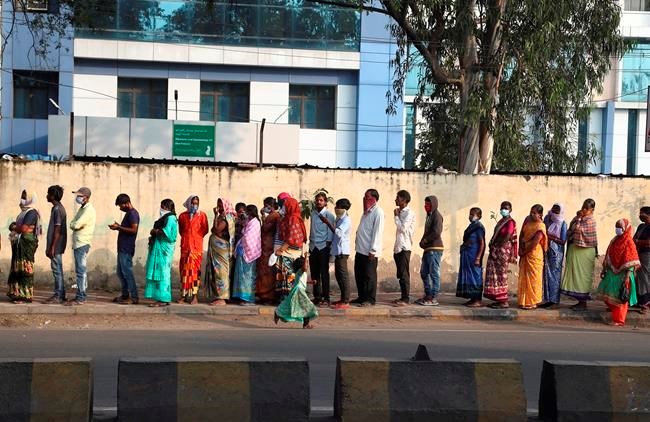MANILA, Philippines — Coronavirus infections in the Philippines have surged past 500,000 in a new bleak milestone with the government facing criticism for failing to immediately launch a vaccination program amid a global scramble for COVID-19 vaccines.
The Department of Health reported 1,895 new infections Sunday, bringing confirmed coronavirus cases in the country to 500,577, the second highest in Southeast Asia. There have been at least 9,895 deaths.
The Philippines has been negotiating with seven Western and Chinese companies to secure 148 million doses of COVID-19 vaccine but the effort has been fraught with uncertainties and confusion. About 50,000 doses from China-based Sinovac Biotech Ltd. may arrive later next month followed by much larger shipments, according to the government, but concerns have been raised over its efficacy.
President Rodrigo Duterte says securing the vaccines has been difficult because wealthy nations have secured massive doses for their citizens first.
Duterte’s elite guards have acknowledged they have been inoculated with a still-unauthorized COVID-19 vaccine partly to ensure that they would not infect the 75-year-old president. Duterte’s spokesman and other officials have denied the president himself was vaccinated.
A flurry of criticism has followed the illegal vaccinations, but few details have been released, including which vaccine was used and how the guards obtained it. Some senators moved to investigate, but Duterte ordered his guards not to appear before the Senate.
In other developments in the Asia-Pacific region:
— Japanese Prime Minister Yoshihide Suga vowed Monday to get the pandemic under control and hold the already postponed Olympics this summer with ample coronavirus protection. In a speech opening a new parliament session, Suga said his government will revise laws to make anti-virus measures enforceable with penalties and compensation. Early in the pandemic, Japan was able to keep its virus caseload manageable with non-binding requests for businesses to close or operate with social distancing and for people to stay home. But recent weeks have seen several highs in new cases per day, in part blamed on eased attitudes toward the anti-virus measures, and doubts are growing as more-contagious variants spread while people wait for vaccines and the Olympics draw closer. The health ministry also reported Monday that three people who have no record of recent overseas travel had tested positive for the new, more easily transmitted coronavirus variant first reported in Britain, suggesting that it is making its way in Japan. Suga said his government aims to start vaccinations as early as late February. Japan has confirmed more than 330,000 infections and 4,500 deaths from COVID-19, numbers that have surged recently though they are still far smaller than many other countries of its size.
— A Chinese province grappling with a spike in coronavirus cases is reinstating tight restrictions on weddings, funerals and other family gatherings, threatening violators with criminal charges. The notice from the high court in Hebei province did not give specifics, but said all types of social gatherings were now being regulated to prevent further spread of the virus. Hebei has had one of China’s most serious outbreaks in months that comes amid measures to curb the further spread during February’s Lunar New Year holiday. Authorities have called on citizens not to travel, ordered schools closed a week early and conducted testing on a massive scale. Hebei recorded another 54 cases over the previous 24 hours, the National Health Commission said on Monday, while the northern province of Jilin reported 30 cases and Heilongjiang further north reported seven. Beijing had two new cases and most buildings and housing compounds now require proof of a negative coronavirus test for entry.
— Malaysian Prime Minister Muhyiddin Yassin has unveiled a new 15 billion ringgit ($3.7 billion) stimulus to bolster consumption, with the economy expected to reel from a second coronavirus lockdown and an emergency declaration. Muhyiddin obtained royal consent last week to declare a coronavirus emergency, slammed by critics as a desperate bid to cling to power amid defections from his ruling coalition. The emergency, expected to last until Aug. 1, doesn’t involve any curfew or military intervention but suspends Parliament, halts any election and gives Muhyiddin’s government absolute power, including in introducing new laws. It came at the same time as millions in Kuala Lumpur and several high-risk states were placed under a two-week lockdown to halt a surge in coronavirus cases. Muhyiddin on Monday acknowledged concerns over the emergency but repeated that it was only aimed at curbing the coronavirus. He said the economic impact from the lockdown will be manageable because more activities are being allowed this time. He said the stimulus will provide more funds to battle the pandemic and support livelihoods and businesses. A businessman has filed a lawsuit challenging the emergency declaration and the opposition plans to appeal to the king to rescind his support. Malaysia has recorded more than 158,000 coronavirus cases, including 601 deaths.
— Nepal’s health ministry says the country's first cases of the new, more infectious coronavirus variant first found in the United Kingdom have been confirmed in three people who arrived from the U.K. The ministry said Monday that samples from six people who arrived in Nepal last week were sent to a laboratory in Hong Kong with the help of the World Health Organization. Three of the people — two men and a woman — tested positive for the new variant, it said. Two have recovered and one is still sick, the ministry said. Nepal has recorded 267,322 coronavirus cases, including 1,959 deaths.
The Associated Press



